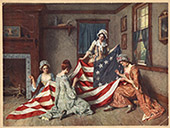Libraries, University of Nebraska-Lincoln
Document Type
Archival Material
Date of this Version
6-4-1801
Citation
Haynes, Lemuel. The Nature and Importance of True Republicanism with a Few Suggestions Favorable to Independence: A Discourse, delivered at Rutland, (Vermont,) the fourth of July, 1801. — It Being the 25th Anniversary of American Independence. Rutland: William Fay, 1801. Electronic Texts in American Studies reprint, ed. Paul Royster. https://digitalcommons.unl.edu/etas/
Abstract
This intriguing document is a political 4th of July “discourse” by an African American New England Congregational ordained minister and Revolutionary War veteran from the very early years of the Republic. Lemuel Haynes’ personal history is an interesting story, as is his assessment of the progress, needs, and future prospects of the new nation. Ostensibly and formally, the discourse is about selecting leadership dedicated to serving the public welfare and avoiding men who seek office for personal preferment, power, or fame. Taking a text from the gospel of Luke, Haynes applies the advice of Jesus to his disciples to the political situation of America, and effectually equates Christianity with “true republicanism,” liberty, and the natural rights of man. Associating the tenets of the Reformed Protestant faith with the foundations of the body politic and the character of the civil authority was quite traditional in New England. Haynes’s discourse is an obvious descendant of the Puritan election sermon or jeremiad, without the catalogue of sins and degeneration by the present generation, but equally assured of the special mission of America in history and its assured glorious future. Instead of the language of covenant and redemption, his language invokes the values of liberty, equality, and independence.
In one (and only one) very interesting paragraph, Haynes addressed the situation of “the poor Africans among us … being subjected to slavery, by the cruel hands of oppressors, they have been taught to view themselves as a rank of beings far below others, which has suppressed, in a degree, every principle of manhood, and so they become despised, ignorant, and licentious.”
Delivered a mere 12 years after the founding of the republic and against a background of revolutions, terrors, and European wars giving rise to new tyrants, this speech asserts America’s uniqueness and anticipates the public celebrations of patriotic nationalism repeated across the ensuing centuries. Haynes was minoritized by race but centered by his position and standing—48 years old and 20 years into a career of serving predominantly white congregations, he had embraced revolution but filtered it through conservative New Light theology and Federalist political sympathies. These seeming contradictions are overcome by his faith and vision of America.
Included in
African American Studies Commons, American Studies Commons, Intellectual History Commons, United States History Commons



Comments
The work is in the public domain. Notes etc. are released under a CC-0 license.